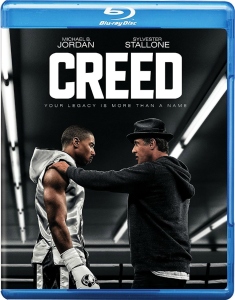“Creed” — the seventh entry in the “Rocky” series — respects its elders while also doing its own thing. As the saga’s first film not written by Sylvester Stallone, and the first not directed by Stallone or John G. Avildsen, “Creed” has a different sense of style. That having been said, Stallone’s Rocky is the heart of the movie, and another old-timer – the late Apollo Creed (who was killed in the ring by Ivan Drago) – is the soul.
Adonis is “Creed’s” muscle, both in the sense that he is in great shape and in the sense that Michael B. Jordan knows how to flex his acting muscles. Jordan plays the son of Apollo and an unseen Miss Johnson with whom the King of Sting had an affair shortly before the tragic events of “Rocky IV.” But, as we learn in the opening segment, Adonis (who goes by Donnie Johnson when we first meet him) lost his birth mother as a teenager, became a delinquent, and was essentially rescued by Apollo’s wife, Mary Anne (Phylicia Rashad, taking over for Sylvia Meals, who was most prominently seen in “Rocky II”).
On my rewatches of the first six “Rocky” films, I noted the likability of the characters and the way the cinematographers captured Philadelphia. But on “Creed,” the direction by Ryan Coogler (who also directed Jordan in “Fruitvale Station”) rises to the fore. Whereas Avildsen’s and Stallone’s direction gave us a comfortable window into Rocky’s world, Coogler aggressively and stylishly slams us into Adonis’ world (and the darker riffs on the classic motifs such as “Flying High Now” enhance this feeling).
In a “wow”-worthy piece of direction that will be talked about for years to come, Coogler shoots Adonis’ first sanctioned fight – against Pete Sporino, ironically a product of Mick’s Gym — in one take. The camera is in the ring with the fighters, sometimes right in their faces. From off camera, we can hear trainer Rocky shouting advice, or hear the referee giving instructions, or hear the crowd yelling cheers and taunts. It’s edge-of-your-seat action, but without traditional quick cuts. Remarkably, seven films in, the series has given us a new way to view a fight. Coogler uses a similar strategy leading up the climactic bout, as he lingers on the entrances of the boxers. In “Rocky,” we felt the buzz of the arena, sure. But in “Creed,” we feel like we’re part of Team Creed.
Jordan, too, has a slightly different style than the “Rocky” norm. Coogler can put a camera on the actor and he’ll run through a variety of emotions in one shot. Adonis is excited to get a crack at the champ, but also terrified. He’s angry at his neighbor, Bianca (“Veronica Mars” veteran Tessa Thompson), for blasting her music, then immediately flustered by her attractiveness. The “Rocky” series’ actors have always been naturalistic, but they tend toward big, rough, lovable, old-school performances. Jordan is smoother. While Jordan’s characters are starting to blend together a bit too much, it’s safe to say I’d follow Adonis as the main character in more movies.

If you haven’t seen the film yet, for God’s sake do so (the fact that “Creed” tells us who won the third fight between Rocky and Apollo is alone worth the ticket price), then come back for the SPOILER-y portion of this post, which continues below.
As ever, Stallone brings a lot of Rocky-ness to his role: He still gets along with everybody and – even though he has now lost both Adrian and Paulie – he looks at the bright side. In one of “Creed’s” most beautiful scenes, he tells the gravestones of his wife and best friend that it’s a nice day, he’s paid all the bills and … he just kind of trails off into a content sort of melancholy.
But it’s clear Stallone did not write Rocky this time; Coogler and Aaron Covington did. Rocky – from Stallone’s pen — was a master at delivering sage advice without sounding critical. In the preceding film, “Rocky Balboa,” he won over Little Marie, his son Robert (who we’re told is now raising a family in Vancouver), and even the boxing commission. In “Creed,” Rocky doesn’t have as much to say. At one point, he says the wrong thing, which leads to a rift between him and Donnie. “Creed” has heart, soul and guts, but while it’s certainly not a dumb movie, it’s also not a brainy movie, and that’s a mild disappointment.
In fact, Adonis possibly teaches (or reminds) Rocky more about life than Rocky teaches Adonis. Granted, it was an understated – and probably accidental — aspect of “Rocky” and “Rocky II” that Rocky taught Mickey some things about how to be a good person. Still, it’s an odd choice in “Creed” to not have Rocky doling out specific lessons to Adonis. The boxing lessons are vague – and mainly communicated through montages – and the life lessons aren’t profound.
Rocky simply being in this movie counts for a lot, though. Some fans theorized that Rocky would bite the dust in a parallel to Mickey in “Rocky III,” so I imagined what “Creed” would be like if Adonis was fighting for Rocky’s memory rather than having Rocky at ringside. As I see it, the movie would lose its heart if it took that route. Adonis Creed can’t stand on his own just yet.
Rounding out the main trio of heroes, Bianca is the anti-Adrian. She’s bursting with confidence and she aggressively goes after a rap music career even though she has progressive hearing loss. The fact that they are both driven people makes for an immediate bond between Donnie and Bianca. They don’t need to tease out traits in each other; they are compatible from the first bell – and therefore kind of boring. Adrian and Rocky they ain’t.
“Pretty” Ricky Conlan (Tony Bellew) is a fresh addition to the pantheon of villains. Notably, he’s Irish, which we hadn’t seen (or heard – you gotta love that brogue) before. Keeping with the trend started in “Rocky V,” Conlan is not a larger-than-life villain, but rather a believable boxer. But he’s actually a scary foe who is respected by the boxing media, whereas Tommy Gunn and Mason “The Line” Dixon were considered paper champions.
Coogler borrows a bit of “Rocky Balboa’s” conceit of showing the statistics of boxers on the screen like a graphic on a televised sporting event. I feared it might become an annoying gimmick after we are introduced to several boxers this way at the gym where Rocky trains Adonis, but the screen doesn’t get overfilled as the movie continues. As with “Balboa,” we get ringside commentary from real boxing journalists – Jim Lampley and Max Kellerman – but it’s not tongue-in-cheek this time; the slight sense of self-parody from previous sequels is excised. My favorite nod to real-world sports reporting is the pitch-perfect “Pardon the Interruption” segment, where Kornheiser and Wilbon debate whether the revelation of Apollo’s infidelity hampers his legacy.
“Creed” repeats a lot of themes from earlier in the series. (OK, it repeats ALL of the themes.) Like Rocky and Apollo, Adonis has a dangerously unquenchable desire to be a boxer, even though it’s a rather unhealthy profession and he doesn’t need to do it for financial reasons (He quits a good desk job, and even if he were temporarily struggling, it’s clear that Mary Anne could help him. She has not squandered the Creed fortune; indeed, she may have expanded it through investments.).
Mary Anne’s fear for her adopted son’s health mirrors that of Adrian for Rocky. “Creed” doesn’t dig deeply into the dangers of the sport – Rocky doesn’t die from brain damage, at least not yet – but it continues the series’ tradition of undercutting a boxer’s glamour with some honest brutality: Adonis’ face looks absolutely grotesque by the end of the title fight, and Mary Anne delivers a memorable monologue about helping Apollo up the stairs after some fights and even having to wipe his ass for him.
Adonis’ “I want to make my own path” complex mirrors that of Rocky Jr. in “Rocky V” and “Balboa.” Donnie keeps his lineage a secret from the world as long as possible.
I do like “Creed’s” invention of a new life battle for Rocky to parallel the battle in the ring: He has non-Hodgkin’s lymphoma, and initially, he wants to let the cancer take its course. There’s little question he would’ve made that choice if not for Adonis coming into his life (although possibly Robert might’ve had something to say).
For all its original touches, “Creed” is – like all the “Rocky” films – formulaic: We get a boxer with a chip on his shoulder, a love story, training sessions where student and mentor bond, a training montage, and a final fight where the hero proves himself, with the fight’s result being of a secondary concern. (As with “Rocky” and “Rocky Balboa,” our hero loses the big bout but wins over the fans and proves his worth to himself.)
Perhaps the familiarity is a flaw of the movie, or perhaps it’s inevitable. But “Creed” is fresh enough. It respects its elders with lots of smile-worthy nods to the series. For example, Adonis movies into Paulie’s old room and finds a stack of girlie mags. I like the warm touches, such as the way Donnie calls Rocky “unc,” short for uncle. And I dug the implication that Apollo’s spirit sparks Adonis to get off the canvas after what should’ve been a knockout punch from Conlan.
And “Creed’s” tricks for bringing a viewer up close and personal with Adonis are more than gimmicks, they are engaging new entry points to this classic material. More new angles will be welcome if there’s a “Creed II” (or “Rocky VIII,” or whatever), but seven films in, this saga is still landing its punches.
More “Rocky”/”Creed” reviews:

